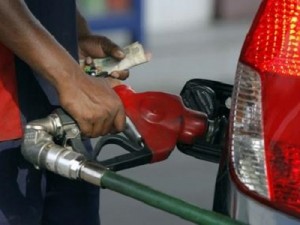 Following the recent reduction in pump price of petrol from N97 per litre to N86 per litre at NNPC stations and N86.50k at other outlets, Nigerians have cheered the federal government as this is no doubt a welcomed development. The decrease in price is said to be a consequence of the drop in the price of refined products resulting from plummeting global crude oil prices. While some Nigerians believe the new prices will be sustained and anticipate further reductions, some others remained puzzled about the reduction and brace themselves for an unexpected hike in the nearest future.
Following the recent reduction in pump price of petrol from N97 per litre to N86 per litre at NNPC stations and N86.50k at other outlets, Nigerians have cheered the federal government as this is no doubt a welcomed development. The decrease in price is said to be a consequence of the drop in the price of refined products resulting from plummeting global crude oil prices. While some Nigerians believe the new prices will be sustained and anticipate further reductions, some others remained puzzled about the reduction and brace themselves for an unexpected hike in the nearest future.
Since the military administration of General Yakubu Gowon increased fuel price in Nigeria in 1973 from 6 kobo per litre to 8.45kobo per litre, it has become a ritual for each successive government to tamper with the official pump price of the product.
In the past, several administrations used the adjustment in the pump price of petrol as a political tool, rather than an economic measure. Consequently, Nigerians have always condemned the persistent hike by taking their protests to the streets, which would lead to occasional downward review by the past administrations.
Following the continuous plunge in oil prices and the glut in the global oil market occasioned by US emergence as exporter of shale oil, Nigeria’s one dimensional economy built on Crude Oil is facing a reduction in foreign exchange and government revenue. There is no doubt that the federal government will be forced to find other areas to make up for the obvious dip in revenue generation as the President highlighted while presenting his budget to the national assembly.

At the moment Nigerian refineries only produce about 7% of the amount of petrol consumed in the nation. This has further put us at a disadvantage as the nation could easily have retorted to refining the product required by its citizens. Although there are plans to revamp the existing refineries as well as building new ones, we will have to import the commodity in the short term, yet there is no provision for subsidy in the 2016 budget.
Based on the foregoing, there is cause for alarm as to how the new prices for the Premium Motor Spirit will be sustained.
MMS Plus reached a senior staff of one of the NNPC Outlets in Lagos who pleaded anonymity as he couldn’t allay the fears of many Nigerians on the possibility of another hike in petrol price in the nearest future.
The source said, “It is a good thing that we can buy petrol at N86 at the moment. The price of this commodity has a way of affecting the prices of other commodities in the market and the general standard of living of most Nigerians”
According to the source, the current price of Premium Motor Spirit (PMS) can be seen as a freebie that we should enjoy while it lasts. He maintained that the government cannot fully regulate and reduce the pump price of petrol until we begin to refine a significant amount of what is consumed here in Nigeria.
“The right modalities haven’t been put in place. We should just wait and see how long the product will remain at this price, but it is very paramount that the government should stabilize it. When it is cheaper everyone is happy and we can channel the surplus fund to somewhere else.” he added.
However the short and long term implications are not quite the same as the previous cases because the Organization of Petroleum Exporting Countries (OPEC) basket price for oil recently crashed as the commodity fell below $30 for the first time in over a decade.
For a one dimensional economy like Nigeria, the implications are quite far reaching because 90 percent of our foreign exchange earnings come from the sale of crude oil. Our annual federal budget is created based on projections made on oil prices and quantity of oil sold and in the 2016 budget the benchmark was set at $38 per barrel, this implies that if things remain as they are or the prices plummet further we will be in serious deficit.
According to recent calculations at the secretariat of the Organization of Petroleum Exporting Countries (OPEC), the price of OPEC basket of thirteen crudes stood at 29.71 dollars a barrel. The global oversupply have continued to pull oil prices to new lows, leading to approximately 70 percent reduction in value than when the downturn began in June 2014.
Another worrisome development is that the US government data is showing that the country’s crude production rose by 17,000 barrels, taking its production capacity to 9.22 million barrels a day, raising the likelihood of further oversupply. Global oversupply is currently within 500,000 to 2 million barrels per day, and could reach 3 million if Iran lives up to its word to add up to one million bpd as soon as possible.
It might take a while for the economic phenomena to trickle down, but sometime in the middle of 2016, if oil prices continue to decline, and oil exports don’t improve, Nigerians should be braced for a sudden dramatic increase in food and transportation costs, among a host of other items. One thing is certain, the shale oil has come to stay and it has changed the global crude oil market. Nigerians should be ready for the change!
By Kenneth Jukpor
 MMS PLUS NG – Maritime, Aviation, Business, Oil and Gas News Online Newspaper with coverage in Maritime, Oil and Gas, Aviation, Power and Energy as well as Financial News
MMS PLUS NG – Maritime, Aviation, Business, Oil and Gas News Online Newspaper with coverage in Maritime, Oil and Gas, Aviation, Power and Energy as well as Financial News









